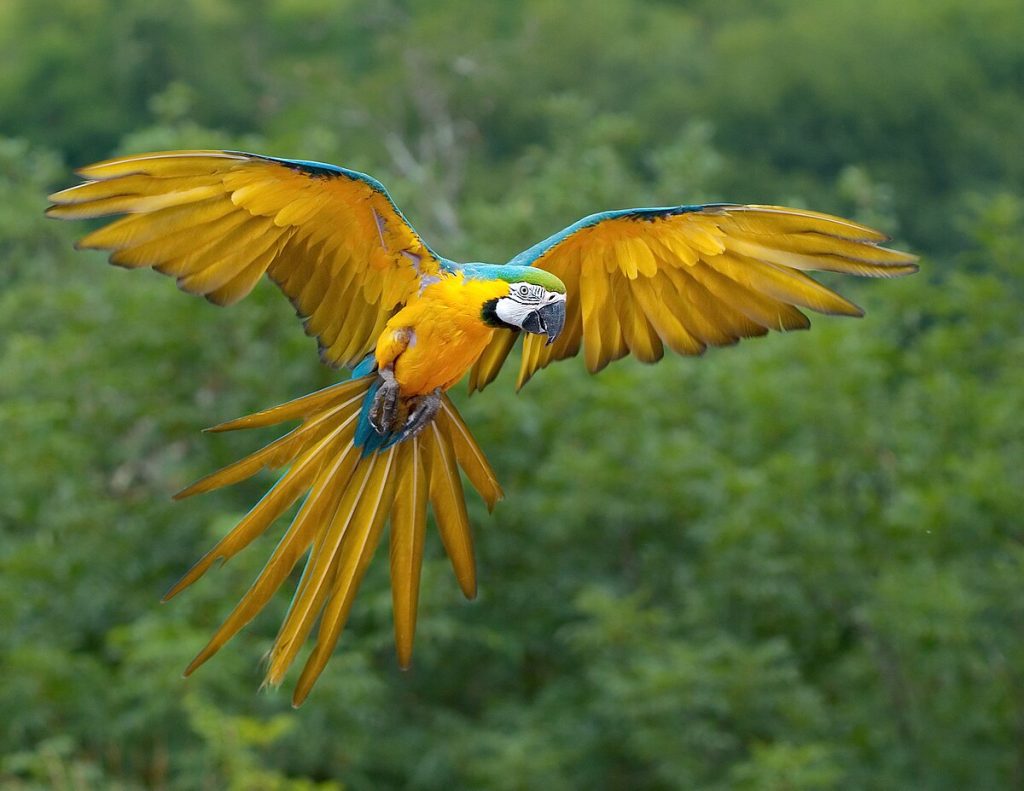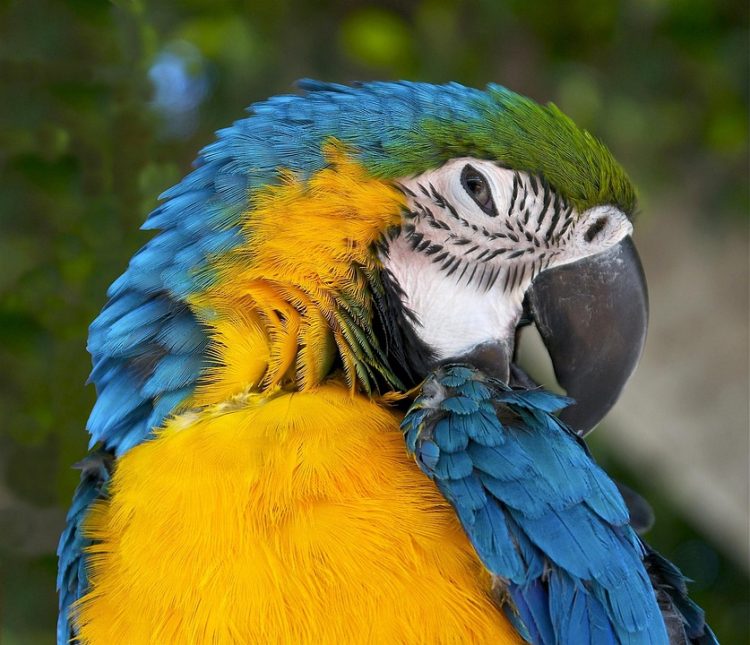Introduction: The Allure and Complexity of Macaws as Pets
Macaws are among the most stunning and intelligent bird species in the world. Known for their vibrant feathers, strong beaks, and lively personalities, they are a favorite among bird enthusiasts and pet owners. However, owning a Macaw is not a decision to be taken lightly. These large, colorful birds require a substantial commitment of time, effort, and resources. With their complex emotional needs, demanding care requirements, and potential lifespan of up to 50 years, Macaws are a long-term companion.
In this article, we will explore everything you need to know about Macaws as pets, including their physical traits, behavior, diet, housing, social needs, health care, training, and more. Whether you’re already a Macaw owner or thinking of adopting one, this guide will help you understand how to provide the best care for these fascinating creatures.
I. The Macaw Species: A Brief Overview
A. What Makes Macaws Unique?
Macaws are members of the Psittacidae family, which includes parrots. They are large, vibrant birds native to Central and South America, with several distinct species.
- Physical Characteristics: Macaws are known for their large size, long tails, and bright, colorful plumage. They typically have strong, curved beaks that are designed to crack open hard nuts and seeds, which are part of their natural diet. Their wingspans can range from 3 to 4 feet, depending on the species.
- Species of Macaws:
- Blue-and-Gold Macaw (Ara ararauna): One of the most common pet Macaw species, known for its striking blue and yellow feathers.
- Scarlet Macaw (Ara macao): Famous for its brilliant red, yellow, and blue plumage, it is one of the most iconic and visually striking Macaws.
- Green-winged Macaw (Ara chloropterus): Recognized by its predominantly green wings and red body, this Macaw is often admired for its size and beauty.
- Hyacinth Macaw (Anodorhynchus hyacinthinus): The largest of all the Macaw species, it is also the rarest and has stunning deep blue feathers.
B. Natural Habitat and Behavior in the Wild
Macaws are native to tropical rainforests and woodlands, where they live in flocks and interact with other species. In the wild, they can be seen flying across the canopy, feeding on fruits, nuts, seeds, and occasionally small insects. They are highly social creatures that form strong bonds with their flockmates, often engaging in playful and complex behaviors.
- Social Structure: In their natural habitat, Macaws live in tight-knit groups, where socializing and bonding are crucial. This behavior translates to their life as pets; they need human interaction and mental stimulation to stay happy and healthy.
- Communication: Macaws are highly vocal and communicate with each other using a range of loud calls and squawks. Their vocalizations are an essential part of their behavior, and they are known for their impressive ability to mimic human speech and sounds.
II. The Responsibilities of Owning a Macaw
A. Lifespan and Long-Term Commitment
Macaws are long-lived animals, with an average lifespan of 30-50 years, depending on the species. This makes them a long-term commitment, and potential owners must consider whether they are prepared to provide for their Macaw’s needs over such an extended period.
- Daily Care: Macaws require daily care, including feeding, socializing, exercise, and cleaning. They are intelligent birds that thrive on interaction and need a stimulating environment.
- Emotional Commitment: Macaws are highly emotional birds. They are known to form deep bonds with their owners, and a lack of attention or social interaction can lead to emotional issues such as depression or aggression. If you’re considering adopting a Macaw, it’s important to be prepared for the emotional investment required.
B. Cost of Ownership
The cost of owning a Macaw can be substantial. Apart from the initial cost of purchasing the bird, there are ongoing expenses for food, toys, cage maintenance, and veterinary care.
- Initial Purchase Price: Depending on the species and whether the bird is hand-raised or wild-caught, the cost of a Macaw can range from $1,000 to $3,000 or more.
- Ongoing Expenses:
- Food: Macaws need a diet that includes a variety of fruits, vegetables, seeds, nuts, and specially formulated bird pellets. This can amount to $50 to $100 per month.
- Cage and Accessories: Macaws need large, sturdy cages that can cost anywhere from $300 to $1,500, depending on the size and quality. They also require toys, perches, and other enrichment items.
- Vet Care: Routine vet check-ups, specialized avian vet services, and emergency care can also be costly. Expect to spend a few hundred dollars annually on vet visits, not including any potential emergency medical needs.
III. Housing Your Macaw
A. Proper Cage Setup
Due to their large size and need for ample space, Macaws require large cages that provide room for movement, climbing, and perching.
- Size of Cage: A Macaw’s cage should be at least 3 feet wide, 3 feet deep, and 5 feet tall, with larger being better. The cage should allow the bird to move around comfortably and have horizontal bars for climbing.
- Materials: Opt for a cage made of non-toxic, durable materials such as stainless steel, as Macaws have strong beaks capable of damaging cheaper materials. The bars should be spaced no more than 1 to 1.5 inches apart to prevent escapes or injury.
- Accessories: Provide various perches, swings, and toys that encourage natural behavior. These accessories help keep your Macaw physically and mentally stimulated.
- Cage Placement: Place the cage in a central, well-lit area of your home where your Macaw can interact with the family. Avoid placing the cage in a drafty or noisy area.
B. Free-Range Time
Macaws are highly active and need ample space to fly and exercise. They should be allowed to roam outside their cage daily, ideally in a bird-safe area such as a bird-proofed room or a large, secure outdoor aviary.
- Exercise: Macaws need at least 2-3 hours of out-of-cage time daily to stretch their wings and burn off excess energy. During this time, you can also engage with your bird in training or play sessions.
- Aviary Space: If you have an outdoor aviary, it should be large enough for your Macaw to fly in. The aviary should also provide enough cover for the bird to feel secure from predators.

IV. Feeding Your Macaw
A. Diet Requirements
Macaws are omnivores, meaning they eat both plant and animal matter in the wild. Their diet in captivity should be varied and balanced to ensure they receive the nutrients they need to stay healthy.
- Pellets: High-quality, specially formulated pellets should be a primary part of their diet. These pellets contain all the essential nutrients that Macaws need to thrive.
- Fresh Fruits and Vegetables: Offer a variety of fresh produce such as apples, bananas, berries, leafy greens, carrots, sweet potatoes, and broccoli. Avoid avocado, chocolate, caffeine, and alcohol, as these can be toxic to birds.
- Nuts and Seeds: Macaws enjoy nuts, such as almonds, walnuts, and Brazil nuts. However, nuts should be given in moderation because they are high in fat.
- Water: Fresh water should be available at all times. Clean the water dish daily to prevent contamination.
B. Foods to Avoid
Certain foods are toxic or harmful to Macaws and should be avoided at all costs:
- Avocado: Contains a toxin called persin, which can cause respiratory and heart failure in birds.
- Chocolate: Contains theobromine, which is toxic to birds and can lead to death.
- Caffeine: Found in coffee, tea, and some sodas, caffeine can cause arrhythmia and death in birds.
- Alcohol: Even small amounts of alcohol can be fatal to birds.
V. Training and Socializing Your Macaw
A. Basic Training Techniques
Macaws are incredibly intelligent and can learn a wide range of behaviors and tricks. Training should be based on positive reinforcement, using rewards like treats, praise, or toys.
- Step-by-Step Training: Start with simple commands such as “step up” or “come.” Use treats to encourage the bird to move toward your hand or follow a specific direction.
- Target Training: Use a small stick or target to teach your Macaw to move toward it. This technique can be used to teach more advanced tricks, such as flying to a designated perch.
- Consistency: Consistency is key. Keep training sessions short, fun, and frequent to maintain your Macaw’s attention.
B. Socialization and Bonding
Macaws are social birds that require plenty of interaction with their owners. Without enough socialization, they can become bored, anxious, or even aggressive.
- Time Together: Spend quality time with your Macaw every day, engaging in activities such as talking, petting, and playing.
- Interactive Toys: Provide toys that promote social play, such as puzzles or interactive toys that require your bird to manipulate objects to get a reward.
- Handling: Gradually introduce your Macaw to different forms of handling, such as being picked up, carried, or gently placed on your shoulder.
VI. Health Care for Macaws
A. Common Health Issues
Macaws are generally healthy birds, but they are susceptible to certain health conditions. Regular veterinary care is essential for keeping your Macaw in good health.
- Feather Plucking: This is a common issue among pet Macaws, often caused by stress, boredom, or poor diet. Providing ample mental and physical stimulation can help prevent feather plucking.
- Respiratory Issues: Due to their sensitive respiratory systems, Macaws can develop lung infections if exposed to smoke, dust, or toxic fumes.
- Obesity: A diet high in fatty foods can lead to obesity, which can affect a bird’s overall health.
B. Routine Veterinary Care
Schedule annual check-ups with an avian vet to ensure your Macaw is healthy. The vet will conduct a physical exam, check for parasites, and assess the bird’s overall health.
- Beak and Nail Care: Keep your Macaw’s beak and nails trimmed regularly to prevent overgrowth. Your vet can help with this if necessary.
- Blood Tests and X-rays: Regular blood tests can help detect early signs of illness, and X-rays can be used to check for respiratory or internal issues.
Conclusion: The Joy and Responsibility of Owning a Macaw
Owning a Macaw is a rewarding experience that comes with both challenges and immense joy. These beautiful, intelligent birds require careful attention, a proper environment, and ongoing interaction to thrive as pets. By understanding their needs, investing time in training and socialization, and providing a balanced diet and a safe space, you can build a fulfilling and long-lasting relationship with your Macaw.
Whether you are already a Macaw owner or are considering bringing one into your home, the information in this article will help you provide the best possible care for your feathered friend. Macaws are not just pets—they are companions that will require your dedication, time, and love for many years to come.























































